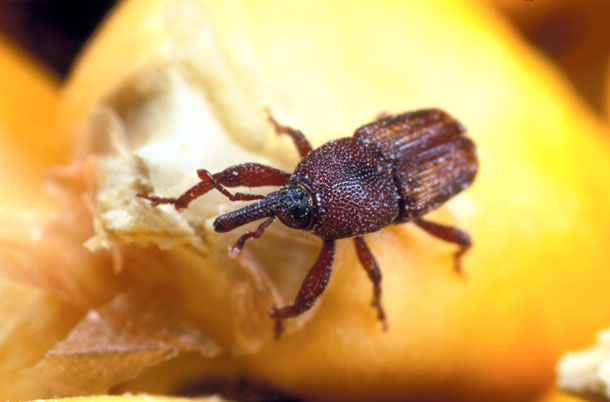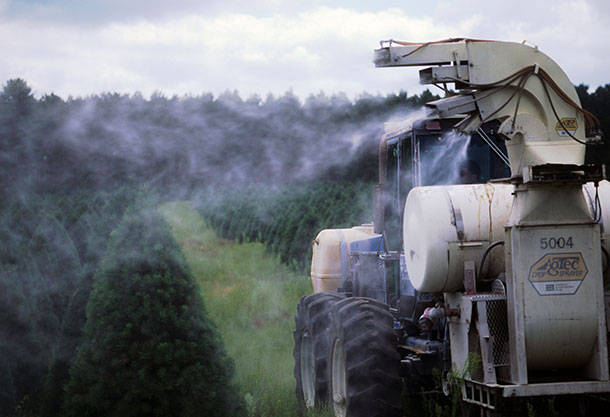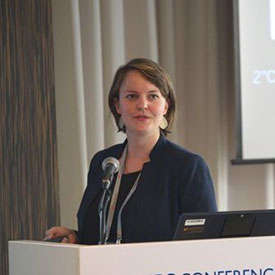Crop Pests in a Warmer World
Air Date: Week of September 7, 2018

A study published in the journal Science found that crop loss to insects is likely to increase with rising temperatures, which will make insects hungrier. Above, a maize weevil munches on an ear of corn. (Photo: US Department of Agriculture, Flickr CC BY 2.0)
Climate disruption poses significant threats to agricultural yields. Now, a new study examines how rising temperatures could lead to increased insect pest activity and dramatic crop loss. Host Steve Curwood spoke with Michelle Tigchelaar, a research associate at the University of Washington and one of the authors on the study.
Transcript
CURWOOD: Climate disruption can be tough on agriculture. Research shows rising temperatures can reduce nutrient quality in staple grains and more droughts and flood can reduce yields. And now scientists are telling us global warming will also bug farmers… literally.
[SOUNDS OF INSECTS BUZZING]
CURWOOD: More heat in temperate zones means more insect pest activity and consequent crop loss. A team at the University of Washington has done the math and team member and research associate Michelle Tigchelaar joins us now to explain.
Welcome back to Living on Earth!
TIGCHELAAR: Thanks for having me again.
CURWOOD: So, what is it about climate disruption that's going to lead to more insect-caused crop loss?
TIGCHELAAR: There are really two components to why we will expect more insects in a warmer climate. The first one is that insects are ectotherms, so that means that as the global temperature raises their body temperatures rise and so they will eat more -- essentially their energy use goes up. And the second component is that as temperatures rise, more insects will survive through the winter and they will reproduce at faster rates. So we get more insects and they will be eating more.
CURWOOD: So, when this insect boom happens, which crops are most at risk?
TIGCHELAAR: All crops globally are affected by pest losses, but the ones that in terms of volume will be most impacted are our main staple crops, so corn, wheat, soy and especially wheat will see larger crop losses mostly because wheat is grown in temperate climates, and that's where we see the largest rises in numbers of insects.
CURWOOD: So, give me a number here please; how much warming leads to how much loss, roughly?
TIGCHELAAR: So, for wheat in particular we saw that two degrees of global warming - which is what we're aiming for with the Paris Agreement but are currently not yet on target for -- with two degrees of global warming we are expecting that in the mid-latitudes where wheat is grown, about 50 to 100 percent increase in how much is lost due to pests; what is currently lost is getting doubled. Our projections show that those crop losses could be in the order of several hundred million tons. But what I also want to emphasize is that these changes in insect pressure are going to happen alongside other climate change impacts on crops. So, this is on top of losses due to warming alone.
CURWOOD: So, the crops don't grow as well when it gets hot, and there are going to be more insects as it gets hotter. Sounds like a nightmare.

Increasing crop loss to hungry insects may encourage farmers to use more pesticides. (Photo: Wisconsin Department of Natural Resources, Flickr CC BY-ND 2.0)
TIGCHELAAR: It does, and on top of that our global population is growing and people are eating more and more Western diets which require more resources to grow. So we're kind of heading towards a crisis here where we need more food, but things being as they are, would be able to grow less of them.
CURWOOD: So, how important around the world would this loss be?
TIGCHELAAR: Combined with the other impacts of climate change on food production these impacts are tremendously important, especially for the more than four billion people on this planet who actually depend critically on staple crops for their sustenance, and households that spend the majority of their income on food, will be extremely vulnerable to price shifts.
CURWOOD: So, this could be a life-threatening issue for many people all over the world. How can we prevent or at least mitigate this massive crop loss?
TIGCHELAAR: Well, the first and foremost thing that we should do it is limit climate change as a whole, and there are several exciting and promising moves in that direction -- either through government intervention or clean energy innovation. But secondly there are also things that farmers and farm policy specialists could be thinking about, especially in the realm of pest management strategies and investments in crop developments, for crops that are more resilient against heat and pests.
CURWOOD: I imagine some would suggest genetically modified crops, so they are insect resistant. And you would say?
TIGCHELAAR: I would say that breeding strategies are going to be a really important part of a solution to climate change, but they're not going to be able to get us there alone. For instance, in terms of breeding for heat resistance, crop scientists have been trying this for several decades with little to no avail. So, that means that also farming practices and perhaps what we eat are going to have to change.
CURWOOD: Now, what about pesticides -- I mean if there are more insects that are trying to eat crops, I would think that farmers are going to roll out the chemicals to try to take out those pests.
TIGCHELAAR: Yes, also that. I am personally not an expert in the field of pesticide usage, but that seems like a logical outcome of an increase in the number of pests which is really concerning giving the detrimental effects of pesticides on the environment.
CURWOOD: How surprised were you by these results?
TIGCHELAAR: I was personally not necessarily surprised. I think our findings make intuitive and scientific sense in the sense that we understand that insects behave this way and are sensitive in this way to higher temperatures and warmth. The unique part of the study was that this was the first time we really quantified how big these impacts could be. And what's surprising about these results was that this is not an insignificant contribution to future crop losses. It is not going to be the dominant factor of how climate impacts crops, but it is not insignificant and will definitely aggravate the problem.
CURWOOD: So, you're saying that we're more likely to see the warming actually making it harder for the crops to grow as opposed to being attacked by more pests.
TIGCHELAAR: There's been a lot of work that already looks at just direct impact of heat on crop losses and together with some of the co-authors on this paper we published findings along those lines earlier this year, too, especially looking at corn, and we find there that two degrees of warming could lead to 20 percent reduction in crop yields. So, in that sense the pest component is smaller but not insignificant and will add to this problem.

Michelle Tigchelaar Ph.D. is a research associate at the University of Washington. (Photo: Courtesy of Michelle Tigchelaar)
CURWOOD: Tell me how much good news is there from this research, if any?
TIGCHELAAR: This may be a little bit speculative, but I think that the good news here is that a lot of these projected impacts are really interconnected, right, between how our society operates and our food is grown. And solving climate change and solving pest impacts and solving sort of the food crises that we're facing here in the United States might have common solutions around better land management practices, better public health policies, and if this kind of work can galvanize those kind of changes that would be a really positive impact.
CURWOOD: Michelle Tigchelaar is a research associate at the University of Washington and co-author of this paper on the projected impact of insects as the climate warms. Thanks so much for taking the time to talk with us today, Michele.
TIGCHELAAR: Thanks for your interest in our work.
Links
New York Times | “The Bugs Are Coming, and They’ll Want More of Our Food”
Science Magazine | “Increase in crop losses to insect pests in a warming climate”
Listen to our previous LOE interview with Michele Tigchelaar
Living on Earth wants to hear from you!
Living on Earth
62 Calef Highway, Suite 212
Lee, NH 03861
Telephone: 617-287-4121
E-mail: comments@loe.org
Newsletter [Click here]
Donate to Living on Earth!
Living on Earth is an independent media program and relies entirely on contributions from listeners and institutions supporting public service. Please donate now to preserve an independent environmental voice.
NewsletterLiving on Earth offers a weekly delivery of the show's rundown to your mailbox. Sign up for our newsletter today!
 Sailors For The Sea: Be the change you want to sea.
Sailors For The Sea: Be the change you want to sea.
 The Grantham Foundation for the Protection of the Environment: Committed to protecting and improving the health of the global environment.
The Grantham Foundation for the Protection of the Environment: Committed to protecting and improving the health of the global environment.
 Contribute to Living on Earth and receive, as our gift to you, an archival print of one of Mark Seth Lender's extraordinary wildlife photographs. Follow the link to see Mark's current collection of photographs.
Contribute to Living on Earth and receive, as our gift to you, an archival print of one of Mark Seth Lender's extraordinary wildlife photographs. Follow the link to see Mark's current collection of photographs.
 Buy a signed copy of Mark Seth Lender's book Smeagull the Seagull & support Living on Earth
Buy a signed copy of Mark Seth Lender's book Smeagull the Seagull & support Living on Earth

